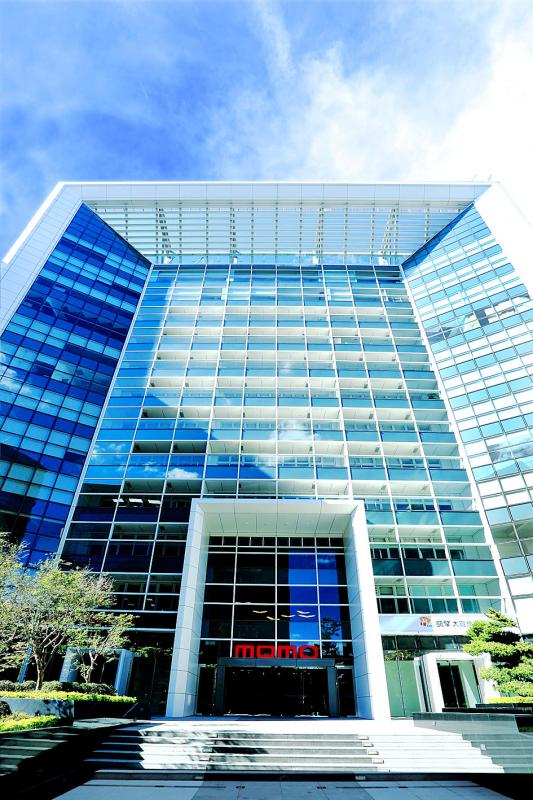Television and online retailer Momo.com Inc (富邦媒體) last week reported its highest quarterly profit since it was listed on the nation’s main board in 2014, driven by steady growth in its online business-to-customer segment and a disposal gain from the sale of Taiwan Pelican Express Co (台灣宅配通) shares.
Net profit increased 76.6 percent annually to NT$780.5 million (US$27.92 million) in the first quarter, or earnings per share of NT$5.57, the company said in a statement on Wednesday.
Momo.com said that its non-operating gains totaled NT$101.5 million in the first quarter, including a NT$99 million disposal gain from Pelican shares.

Photo: Vanessa Cho, Taipei Times
Quarterly revenue rose 21.6 percent to NT$18.36 billion, the second-highest quarterly sales in the company’s history, thanks to its increasing market share in Taiwan’s retail sector as more consumers embrace online shopping amid the COVID-19 pandemic, the company said.
“The number of active users and orders remained at a healthy level of 20 percent year-on-year during the quarter, indicating that Taiwanese consumers’ e-commerce value preference continued to shift to fast and free delivery, one-stop shopping and a quality online shopping experience,” Momo.com said.
Earnings before interest, taxes, depreciation and amortization (EBITDA) increased 42.6 percent to a record NT$1.07 billion in the first quarter, while the blended EBITDA margin came in at 5.8 percent, compared with 5 percent a year earlier, which the company attributed to stronger bargaining power with suppliers, and the effects of a larger sales scale and improved operating efficiency.
Momo.com, a retail subsidiary of Taiwan Mobile Co (台灣大哥大), operates three virtual platforms — online shopping, TV home shopping and catalog shopping.
The favorable results for the January-to-March period came as the firm’s business-to-customer segment, which accounted for 92.3 percent of its total revenue in the first quarter, expanded 24.5 percent year-on-year to NT$16.94 billion, aided by strong sales from fashion and luxury products, consumer electronics and home appliances, as well as greater demand for beauty and healthcare, and sports and leisure goods due to the pandemic.
To maintain its leadership position in Taiwan’s e-commerce market, the company said that it would continue to scale up its logistics network nationwide, including distribution centers and satellite warehouses, which would help it lower costs and shorten shipping times.
Momo.com said that it would start construction of its southern distribution center in Tainan’s Sinshih District (新市) in the second quarter of this year, with operations beginning in 2023.
The company’s northern distribution center in Taoyuan’s Dayuan District (大園) opened in 2017.
The company also aims to expand its number of satellite warehouses to 30, from 22, by the end of this year, it added.
Satellite warehouses serve as delivery access points where products are pre-stocked to shorten delivery times and improve operating efficiency, it said.

TECH CLUSTER: The US company’s new office is in the Shalun Smart Green Energy Science City, a new AI industry base and cybersecurity hub in southern Taiwan US chip designer Advanced Micro Devices Inc (AMD) yesterday launched an office in Tainan’s Gueiren District (歸仁), marking a significant milestone in the development of southern Taiwan’s artificial intelligence (AI) industry, the Tainan City Government said in a statement. AMD Taiwan general manager Vincent Chern (陳民皓) presided over the opening ceremony for the company’s new office at the Shalun Smart Green Energy Science City (沙崙智慧綠能科學城), a new AI industry base and cybersecurity hub in southern Taiwan. Facilities in the new office include an information processing center, and a research and development (R&D) center, the Tainan Economic Development Bureau said. The Ministry

ADVERSARIES: The new list includes 11 entities in China and one in Taiwan, which is a local branch of Chinese cloud computing firm Inspur Group The US added dozens of entities to a trade blacklist on Tuesday, the US Department of Commerce said, in part to disrupt Beijing’s artificial intelligence (AI) and advanced computing capabilities. The action affects 80 entities from countries including China, the United Arab Emirates and Iran, with the commerce department citing their “activities contrary to US national security and foreign policy.” Those added to the “entity list” are restricted from obtaining US items and technologies without government authorization. “We will not allow adversaries to exploit American technology to bolster their own militaries and threaten American lives,” US Secretary of Commerce Howard Lutnick said. The entities

Minister of Finance Chuang Tsui-yun (莊翠雲) yesterday told lawmakers that she “would not speculate,” but a “response plan” has been prepared in case Taiwan is targeted by US President Donald Trump’s reciprocal tariffs, which are to be announced on Wednesday next week. The Trump administration, including US Secretary of the Treasury Scott Bessent, has said that much of the proposed reciprocal tariffs would focus on the 15 countries that have the highest trade surpluses with the US. Bessent has referred to those countries as the “dirty 15,” but has not named them. Last year, Taiwan’s US$73.9 billion trade surplus with the US

The Taipei International Cycle Show (Taipei Cycle) yesterday opened at the Taipei Nangang Exhibition Center, with the event’s organizer expecting a steady recovery in the industry this year following a tough last year. This year, 980 companies from 35 countries are participating in the annual bicycle trade show, showcasing technological breakthroughs and market development trends of the bicycle industry at 3,600 booths, the Taiwan External Trade Development Council (TAITRA, 外貿協會) said in a statement. Under the theme “Ride the Revolution,” the exhibition has attracted more than 3,500 international buyers from 80 countries to preregister for the four-day event, which is expected to